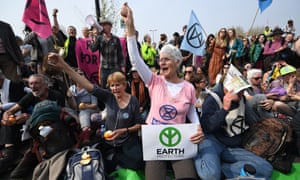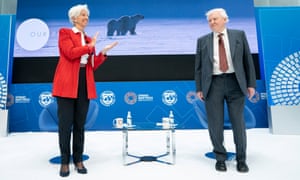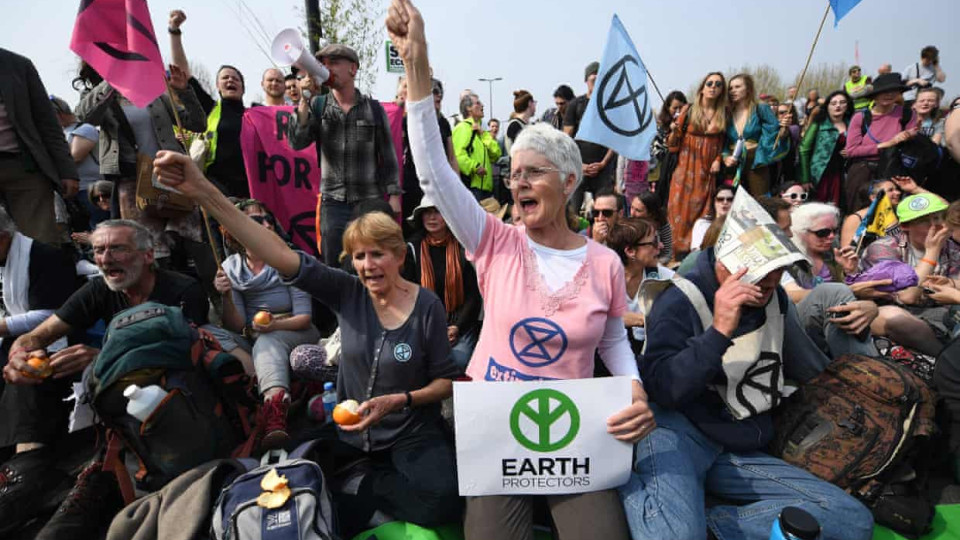
The Bank of England governor spoke the language that the City would understand, but governments also need to embrace new ideas to help shift the dial

Mark Carney got right to the heart of the matter in his message to the City about the risks of climate change: take global warming seriously or you will lose money. This is the sort of language foreign exchange dealers and derivatives traders understand. For the most part, they don’t tend to be eco warriors, even though their sons and daughters might be. What they care about is profit and loss, the good old bottom line.
So that’s how the Bank of England’s governor approached his subject. Companies that don’t adjust to the reality of global warming will simply cease to exist. You don’t get much blunter than that.
Carney has been pressing the City on this issue for a while, but the timing of his intervention was significant. The climate-change activists of Extinction Rebellion, who have been disrupting the transport systems in London and other cities this week, have been insisting that it is time for policymakers to take global warming seriously. Finally it seems as if they are.
It feels as if the tide has finally turned against those who have steadfastly insisted that climate change is a delusion
David Attenborough was given a platform last week at the International Monetary Fund to warn of the dangers of business as usual. He received a standing ovation. Donald Trump’s appointee to run the World Bank, David Malpass, used his first meeting with staff members to reassure them that there would be no let-up in the organisation’s attempt to help poor countries with climate-change mitigation and adaptation. Beyond the confines of Washington DC, a new wave of activists has been radicalised by the idea that the US could once again be transformed by a “new deal”, this time rooted in the struggle to save the planet.
All this is real progress. When the Green New Deal was first proposed as a solution to the financial crash and deep recession of a decade ago, it had a brief moment in the sun before sinking without trace. But it has been given a new lease of life following support from the newly appointed New York congresswoman Alexandria Ocasio-Cortez, even though she now says her plan was rolled out too fast.
There will certainly be other setbacks, but it feels as if the tide has finally turned against those who have steadfastly insisted that climate change is a delusion. Just as in late 1938 and early 1939, the appeasers – or, at least, most of them – know that the game is up. It is as pointless to dismiss the threat of global warming now as it was to argue after Munich that Hitler’s demands could be peacefully met.
The struggle against fascism was pursued with vigour once the penny finally dropped. Economies were put on a war footing. The issues that had previously obsessed central banks and finance ministries – balancing the budget, controlling inflation – dwindled to insignificance. The economy’s purpose was to churn out the military equipment needed for victory. Nothing else mattered. The questions facing policymakers now are similar to those of the 1930s.
Can global warming really be equated with fascism? How could economies possibly be put on an environmental war footing? Does the battle to save the planet mean the smashing of capitalism, or is capitalism’s great strength – its ability to innovate – the secret to winning the battle?

The answer to the first question is simple: the risk of allowing global temperatures to rise by 2C is just as big as the risk of not standing up to Hitler, if not greater. And time is running out.
Putting economies on an environmental war footing is going to be tougher, because unlike in the late 1930s the danger is harder to see and takes longer to materialise. There are no invading armies massing on the border to concentrate minds, and that means governments need to embrace ideas – such as the Green New Deal – that can help shift the dial. The secret to securing popular support is to marry two ideas – environmentalism and social justice.
In the UK, Labour gets it. John McDonnell, the shadow chancellor, called Carney’s speech a “breakthrough moment”, and pledged that Labour would rewrite the government’s criteria for approving investment projects so that they made a priority of tackling climate change. Capitalism in its current form is certainly part of the problem. The obsession with growth at all costs, the failure to make polluters pay the full cost of the damage they cause, the focus on short-term profit at the expense of long-term stability, have all brought us to where we are now.
The debate – which splits the Green movement – is whether capitalism can be part of the solution. For some the answer is no, and they believe Green New Dealers are kidding themselves if they think they can change a fatally flawed and inherently doomed system.
On the other side of the argument are those who say that falling costs for renewable energy, the rapid progress being made in battery storage, and the money the motor industry is investing in clean alternatives to the internal combustion engine are all signs that a technological fix can be found.
Capitalism, according to this view, can adapt to any regime. If politicians create the right incentives – through taxes, subsidies and regulations – the green revolution will follow. The example here is not FDR’s New Deal but John F Kennedy’s announcement in 1961 that he wanted a man on the moon by the end of the decade. Set a mission and wait for the innovation.
Yet in one sense, the debate between the two wings of the green movement is premature because the world is a long way from putting itself on a climate-change war footing. Carney’s warning accompanied a report from the Network for Greening the Financial System, an international coalition of central banks and regulators who think action is necessary. But the most powerful central bank of all – the US Federal Reserve – is not a member. This is a coalition of the willing that does not include Trump.
What’s more, it is a coalition that ought to be more ambitious. Since the Bank of England accepts that climate change is an existential threat, it should insist that banks hold more capital against the likelihood of future losses if they end up with “stranded assets” on their books, such as an investment in a coalmine or an oil field that might be made worthless if governments ban the burning of fossil fuels.
Will Mark Carney mention climate change when the Bank of England publishes its quarterly health check on the economy next month, or will it be the usual diet of growth, inflation and interest rates? When will the IMF give the same prominence to global temperature as it gives to global GDP? Only when these things happen will victory be in sight.
Until then, as Churchill said after El Alamein, this is not the end, it is not even the beginning of the end. It is, perhaps, the end of the beginning.
The Guardian











Leave a comment